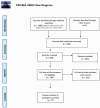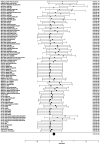Far Transfer Effects of Trainings on Executive Functions in Neurodevelopmental Disorders: A Systematic Review and Metanalysis
- PMID: 36633797
- PMCID: PMC10920464
- DOI: 10.1007/s11065-022-09574-z
Far Transfer Effects of Trainings on Executive Functions in Neurodevelopmental Disorders: A Systematic Review and Metanalysis
Abstract
Executive Functions are a set of interrelated, top-down processes essential for adaptive goal-directed behaviour, frequently impaired across different neurodevelopmental disorders with variable degrees of severity. Many executive-function-training studies in children with neurodevelopmental disorders have focused on near effects, investigating post-treatment improvements on directly trained processes, while enhancements of skills not directly trained, defined as far effects, are less considered, albeit these could be extremely relevant for reducing the negative impact of a disorder's core symptomatology. This systematic review and metanalysis aims to investigate the far effect outcomes after EF training in children with different types of neurodevelopmental disorders. 17 studies met the inclusion criteria for the systematic review, while 15 studies were selected in the metanalysis. An overall statistically significant effect size was found in the majority of far effect outcome measures considered in the studies. In particular, trainings on executive functions determine significant far effects on daily life functioning (0.46, 95% CI: [0.05-0.87]) and clinical symptoms (0.33, 95% CI: [0.15-0.51]). Despite a high variability of the results, intensity, frequency and the laboratory/life contexts dimension seem to be the most influential variables in determining far effects. This systematic review and metanalysis highlights the need to measure far effects of executive function training in neurodevelopmental disorders, selecting treatments not only on directly targeted processes, but also according to far impacts on the functional weakness of the disorder.
Keywords: Children; Executive functions; Far effect; Neurodevelopmental disorders.
© 2023. The Author(s).
Conflict of interest statement
The authors have no competing interests to declare that are relevant to the content of this article.
Figures






Similar articles
-
Technological aids for the rehabilitation of memory and executive functioning in children and adolescents with acquired brain injury.Cochrane Database Syst Rev. 2016 Jul 1;7(7):CD011020. doi: 10.1002/14651858.CD011020.pub2. Cochrane Database Syst Rev. 2016. PMID: 27364851 Free PMC article.
-
Parent training interventions for Attention Deficit Hyperactivity Disorder (ADHD) in children aged 5 to 18 years.Cochrane Database Syst Rev. 2011 Dec 7;2011(12):CD003018. doi: 10.1002/14651858.CD003018.pub3. Cochrane Database Syst Rev. 2011. PMID: 22161373 Free PMC article.
-
Home treatment for mental health problems: a systematic review.Health Technol Assess. 2001;5(15):1-139. doi: 10.3310/hta5150. Health Technol Assess. 2001. PMID: 11532236
-
Educational interventions for the management of cancer-related fatigue in adults.Cochrane Database Syst Rev. 2016 Nov 24;11(11):CD008144. doi: 10.1002/14651858.CD008144.pub2. Cochrane Database Syst Rev. 2016. PMID: 27883365 Free PMC article.
-
Systemic pharmacological treatments for chronic plaque psoriasis: a network meta-analysis.Cochrane Database Syst Rev. 2021 Apr 19;4(4):CD011535. doi: 10.1002/14651858.CD011535.pub4. Cochrane Database Syst Rev. 2021. Update in: Cochrane Database Syst Rev. 2022 May 23;5:CD011535. doi: 10.1002/14651858.CD011535.pub5. PMID: 33871055 Free PMC article. Updated.
Cited by
-
Understanding social cognition in children with cerebral palsy: exploring the relationship with executive functions and the intervention outcomes in a randomized controlled trial.Eur J Pediatr. 2024 Sep;183(9):3997-4008. doi: 10.1007/s00431-024-05635-y. Epub 2024 Jun 29. Eur J Pediatr. 2024. PMID: 38951253 Free PMC article. Clinical Trial.
-
Unraveling the spectrum: overlap, distinctions, and nuances of ADHD and ASD in children.Front Psychiatry. 2024 Sep 13;15:1387179. doi: 10.3389/fpsyt.2024.1387179. eCollection 2024. Front Psychiatry. 2024. PMID: 39345916 Free PMC article. Review.
-
Dynamic Mathematical Processing Through Symbolic, Situational, and Verbal Representations.Integr Psychol Behav Sci. 2025 Mar 12;59(1):33. doi: 10.1007/s12124-025-09899-3. Integr Psychol Behav Sci. 2025. PMID: 40072782
-
Executive Functions and Public Health: A Narrative Review.Iran J Public Health. 2023 Aug;52(8):1589-1599. doi: 10.18502/ijph.v52i8.13398. Iran J Public Health. 2023. PMID: 37744538 Free PMC article. Review.
-
Effects of Physical Activity on Cognition, Behavior, and Motor Skills in Youth with Autism Spectrum Disorder: A Systematic Review of Intervention Studies.Behav Sci (Basel). 2024 Apr 15;14(4):330. doi: 10.3390/bs14040330. Behav Sci (Basel). 2024. PMID: 38667126 Free PMC article. Review.
References
Publication types
MeSH terms
Grants and funding
LinkOut - more resources
Full Text Sources
Medical
Miscellaneous

